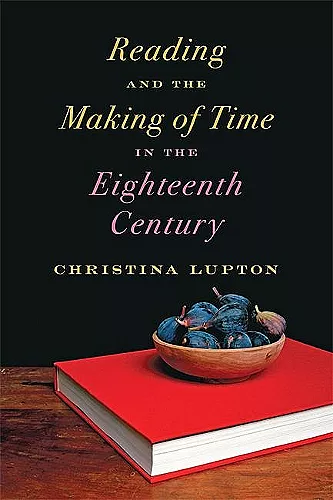Reading and the Making of Time in the Eighteenth Century
Format:Hardback
Publisher:Johns Hopkins University Press
Published:14th Aug '18
Currently unavailable, and unfortunately no date known when it will be back

How did eighteenth-century readers find and make time to read?
Books have always posed a problem of time for readers. Becoming widely available in the eighteenth century—when working hours increased and lighter and quicker forms of reading (newspapers, magazines, broadsheets) surged in popularity—the material form of the codex book invited readers to situate themselves creatively in time. Drawing on letters, diaries, reading logs, and a range of eighteenth- and early nineteenth-century novels, Christina Lupton’s Reading and the Making of Time in the Eighteenth Century concretely describes how book-readers of the past carved up, expanded, and anticipated time.
Placing canonical works by Elizabeth Inchbald, Henry Fielding, Amelia Opie, and Samuel Richardson alongside those of lesser-known authors and readers, Lupton approaches books as objects that are good at attracting particular forms of attention and paths of return. In contrast to the digital interfaces of our own moment and the ephemeral newspapers and pamphlets read in the 1700s, books are rarely seen as shaping or keeping modern time. However, as Lupton demonstrates, books are often put down and picked up, they are leafed through as well as read sequentially, and they are handed on as objects designed to bridge temporal distances. In showing how discourse itself engages with these material practices, Lupton argues that reading is something to be studied textually as well as historically.
Applying modern theorists such as Niklas Luhmann, Bruno Latour, and Bernard Stiegler, Lupton offers a rare phenomenological approach to the study of a concrete historical field. This compelling book stands out for the combination of archival research, smart theoretical inquiry, and autobiographical reflection it brings into play.
What makes Lupton's thoughtful and learned new book, Reading and the Making of Time in the Eighteenth Century, so interesting... is that she presents a set of exemplary readers and writers whose reflective encounters with books highlight the utility of the codex as a technique for thinking about time in its many meanings. The result is a vigorous and partially novel defense of the value of books and the humanities to a happy and meaningful life... Rather than seeing time as a scarce, homogeneous resource to be economized or optimized, Lupton invites us to follow her in seeing books as things that introduce difference, discontinuity, and even plasticity into time itself.
—David Henkin, Public Books
The big achievement here is to set the book in motion, wrenching it free of its disciplinary moorings and putting it back into the flux and flow of time. Reading and the Making of Time in the Eighteenth Century is a slim book, but dense, pointing forward itself to future possibilities and new angles on the history of reading.
—Gill Partington, Cambridge University, LA Review of Books
Memoir-like elements give Lupton's book a vivid immediacy rarely achieved in scholarly writing . . . she shows us how reading feels, in both its social and its most deeply personal aspects . . . Her book goes beyond the perennial problem of how, amid life's many distractions, we might carve out time to read. Reading itself, she argues, "makes" time: books allow us to apprehend time as something elusive and elastic, less a resource to be exploited than an experience to be explored.
—David Winters, Times Literary Supplement
The excitement of acquiring concrete, pocketable books in the hope of perhaps someday reading their contents forms in the mind a modest but palpable self who may be permitted by circumstance to do so—a self still waiting in the wings. For them Reading and the Making of Time is written.
—Nan Z. Da, University of Notre Dame, The Hedgehog Review
Christina Lupton's Reading and the Making of Time in the Eighteenth Century is a fascinating exploration of how books—even those we don't get around to reading—shape our experience of time . . . Lupton's elegant prose render her complex ideas remarkably accessible . . . the book is ideally suited to course syllabi at the graduate and advanced undergraduate levels. Making of Time is certain to leave an impact on eighteenth-century studies, book history, and theories of reading. Moreover, its fresh perspective on the utility of activities generally deemed non-useful make it broadly applicable to other kinds of media studies including film and gaming.
—Matthew Risling, University of Michigan – Shanghai Jiao Tong University Joint Institute, Review of English Studies
That Christina Lupton's Reading and the Making of Time in the Eighteenth Century is best read slowly and carefully testifies to its achievement as both a rigorously researched history and a philosophy of reading for the present . . . For anyone invested in reading books, teaching books, or simply making time for books, Reading and the Making of Time in the Eighteenth Century is just such a worthwhile commitment.
—Alexander Creighton, Harvard University, Studies in Romanticism
ISBN: 9781421425764
Dimensions: 229mm x 152mm x 20mm
Weight: 431g
216 pages